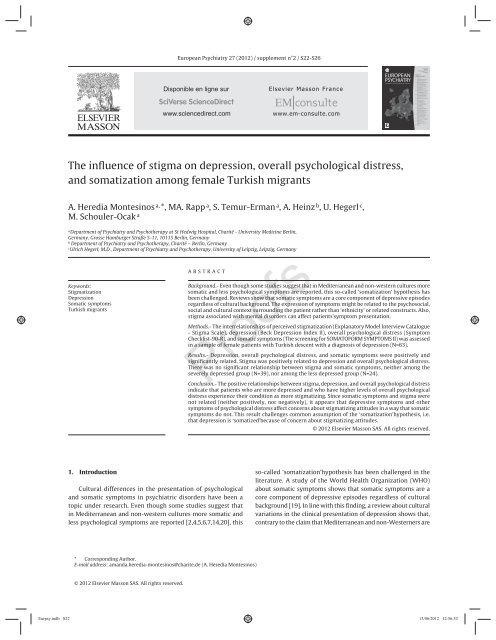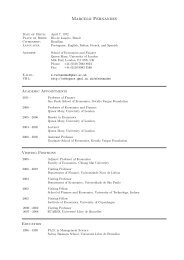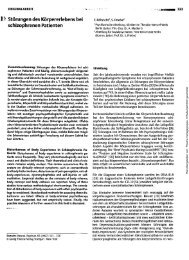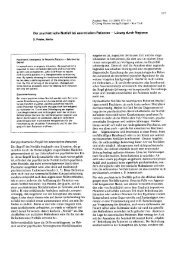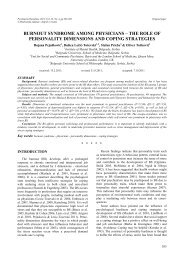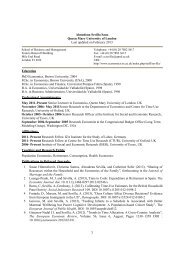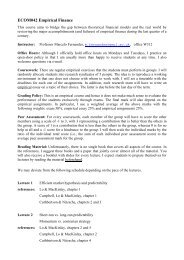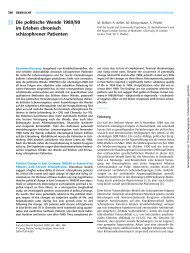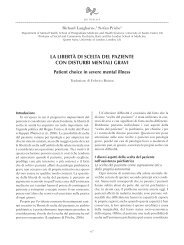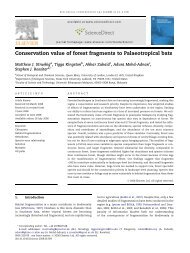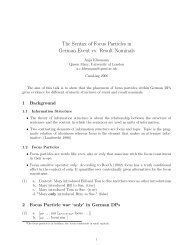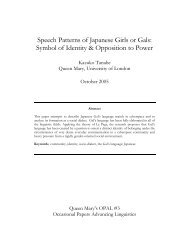Proofs - Personal Webspace for QMUL - Queen Mary, University of ...
Proofs - Personal Webspace for QMUL - Queen Mary, University of ...
Proofs - Personal Webspace for QMUL - Queen Mary, University of ...
Create successful ePaper yourself
Turn your PDF publications into a flip-book with our unique Google optimized e-Paper software.
© 2012 Elsevier Masson SAS. All rights reserved.<br />
European Psychiatry 27 (2012) / supplement n°2 / S22-S26<br />
ABSTRACT<br />
<strong>Pro<strong>of</strong>s</strong><br />
68767<br />
EUROPEAN<br />
PSYCHIATRY<br />
THE JOURNAL OF THE EUROPEAN PSYCHIATRIC ASSOCIATION<br />
The infl uence <strong>of</strong> stigma on depression, overall psychological distress,<br />
and somatization among female Turkish migrants<br />
A. Heredia Montesinos a, *, MA. Rapp a , S. Temur- Erman a , A. Heinz b , U. Hegerl c ,<br />
M. Schouler- Ocak a<br />
a Department <strong>of</strong> Psychiatry and Psychotherapy at St Hedwig Hospital, Charité - <strong>University</strong> Medicine Berlin,<br />
Germany. Grosse Hamburger Straße 5- 11, 10115 Berlin, Germany<br />
b Department <strong>of</strong> Psychiatry and Psychotherapy, Charité – Berlin, Germany<br />
c Ulrich Hegerl, M.D., Department <strong>of</strong> Psychiatry and Psychotherapy, <strong>University</strong> <strong>of</strong> Leipzig, Leipzig, Germany<br />
Keywords:<br />
Stigmatization<br />
Depression<br />
Somatic symptoms<br />
Turkish migrants<br />
1. Introduction<br />
Cultural differences in the presentation <strong>of</strong> psychological<br />
and somatic symptoms in psychiatric disorders have been a<br />
topic under research. Even though some studies suggest that<br />
in Mediterranean and non- western cultures more somatic and<br />
less psychological symptoms are reported [2,4,5,6,7,14,20], this<br />
* Corresponding Author.<br />
E-mail address: amanda.heredia- montesinos@charite.de (A. Heredia Montesinos)<br />
ISSN 0924-9338<br />
June 2012<br />
Vol. 27 - Supplement n°2<br />
pp. S1-S81<br />
Migration<br />
and Mental Health<br />
S1 Editorial<br />
A. Heinz, U. Kluge<br />
S4 The willingness to participate in health research<br />
studies <strong>of</strong> individuals with Turkish migration<br />
backgrounds: barriers and resources<br />
D. Dingoyan, H. Schulz, M. Mösko<br />
S10 Socio-economic status and emotional distress<br />
<strong>of</strong> female Turkish immigrants and native<br />
German women living in Berlin<br />
MC. Aichberger, Z. Br omand, A. Heredia<br />
Montesinos, S. Temur-Erman, A. Mundt,<br />
A. Heinz, MA. Rapp, M. Schouler-Ocak<br />
S17 Mental health <strong>of</strong> Turkish women in Germany:<br />
resilience and risk factors<br />
Z. Bromand, S. Temur-Erman, R. Yesil,<br />
A. Heredia Montesinos, MC. Aichberger,<br />
D. Kleiber, M. Schouler-Ocak, A. Heinz,<br />
MC. Kastrup, MA. Rapp<br />
S22 The infl uence <strong>of</strong> stigma on depression, overall<br />
psychological distress, and somatization<br />
among female Turkish migrants<br />
A. Heredia Montesinos, MA. Rapp, S. T emur-<br />
Erman, A. Heinz, U. Hegerl, M. Schouler-Ocak<br />
S27 Translation and adaptation <strong>of</strong> the Zung<br />
Self-Rating Depression Scale <strong>for</strong> application<br />
in the bilingual Azerbaijani population<br />
F. Mammadova, M. Sultanov, A. Hajiyeva,<br />
M. Aichberger, A. Heinz<br />
S32 Construction and interpretation <strong>of</strong> self-related<br />
function and dysfunction in Intercultural<br />
Psychiatry<br />
A. Heinz, F. Bermpohl, M. Frank<br />
S44 Explanatory models and concepts<br />
<strong>of</strong> West African Malian patients<br />
with psychotic symptoms<br />
F. Napo, A. Heinz, A. Auckenthaler<br />
S50 How to express mental health problems:<br />
Turkish immigrants in Berlin compared<br />
to native Germans in Berlin<br />
and Turks in Istanbul<br />
A. Vardar, U. Kluge, S. P enka<br />
S56 Health services and the treatment<br />
<strong>of</strong> immigrants: data on service use, interpreting<br />
services and immigrant staff members<br />
in services across Europe<br />
U. Kluge, M. Bogic, W. Devillé, T. Greacen,<br />
M. Dauvrin, S. Dias, A. Gaddini, NK. Jensen,<br />
E. Ioannidi-Kapolou, R. Mertaniemi,<br />
R. P uipcinós i Riera, S. Sandhu, A. Sar vary,<br />
JFF. Soares, M. Stankunas, C. Straßmayr ,<br />
M. Welbel, A. Heinz, S. Priebe<br />
S63 The concept <strong>of</strong> “intercultural opening”:<br />
development <strong>of</strong> an assessment tool<br />
<strong>for</strong> the appraisal <strong>of</strong> its current implementation<br />
in the mental health care system<br />
S. P enka, U. Kluge, A. Vardar, T. Borde,<br />
D. Ingleby<br />
S 70 Cross-cultural training in mental health care<br />
– challenges and experiences from Sweden<br />
and Germany<br />
S. Bäär nhielm, M. Mösko<br />
S75 Teaching psychiatry and establishing<br />
psychosocial services – lessons<br />
from Afghanistan<br />
I. Missmahl, U. Kluge, Z. Br omand, A. Heinz<br />
S80 Epilogue<br />
A. Kleinman<br />
Background.- Even though some studies suggest that in Mediterranean and non- western cultures more<br />
somatic and less psychological symptoms are reported, this so- called ‘somatization’ hypothesis has<br />
been challenged. Reviews show that somatic symptoms are a core component <strong>of</strong> depressive episodes<br />
regardless <strong>of</strong> cultural background. The expression <strong>of</strong> symptoms might be related to the psychosocial,<br />
social and cultural context surrounding the patient rather than ‘ethnicity’ or related constructs. Also,<br />
stigma associated with mental disorders can affect patients’symptom presentation.<br />
Methods.- The interrelationships <strong>of</strong> perceived stigmatization (Explanatory Model Interview Catalogue<br />
- Stigma Scale), depression (Beck Depression Index II), overall psychological distress (Symptom<br />
Checklist- 90- R), and somatic symptoms (The screening <strong>for</strong> SOMATOFORM SYMPTOMS II) was assessed<br />
in a sample <strong>of</strong> female patients with Turkish descent with a diagnosis <strong>of</strong> depression (N=63).<br />
Results.- Depression, overall psychological distress, and somatic symptoms were positively and<br />
signifi cantly related. Stigma was positively related to depression and overall psychological distress.<br />
There was no signifi cant relationship between stigma and somatic symptoms, neither among the<br />
severely depressed group (N=39), nor among the less depressed group (N=24).<br />
Conclusion.- The positive relationships between stigma, depression, and overall psychological distress<br />
indicate that patients who are more depressed and who have higher levels <strong>of</strong> overall psychological<br />
distress experience their condition as more stigmatizing. Since somatic symptoms and stigma were<br />
not related (neither positively, nor negatively), it appears that depressive symptoms and other<br />
symptoms <strong>of</strong> psychological distress affect concerns about stigmatizing attitudes in a way that somatic<br />
symptoms do not. This result challenges common assumption <strong>of</strong> the ‘somatization’hypothesis, i.e.<br />
that depression is ‘somatized’because <strong>of</strong> concern about stigmatizing attitudes.<br />
© 2012 Elsevier Masson SAS. All rights reserved.<br />
so- called ‘somatization’hypothesis has been challenged in the<br />
literature. A study <strong>of</strong> the World Health Organization (WHO)<br />
about somatic symptoms shows that somatic symptoms are a<br />
core component <strong>of</strong> depressive episodes regardless <strong>of</strong> cultural<br />
background [19]. In line with this fi nding, a review about cultural<br />
variations in the clinical presentation <strong>of</strong> depression shows that,<br />
contrary to the claim that Mediterranean and non- Westerners are


